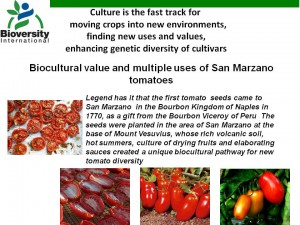 Our friend, colleague and, apparently, occasional reader Pablo Eyzaguirre, an anthropologist at Bioversity International, by all accounts gave a barnstorming performance in an internal seminar recently, but alas all that is available of it at the moment for those of us who were not there is his PowerPoint presentation, whose title we have stolen for this post. That is, of course, better than nothing, and I’m certainly not complaining. 1
Our friend, colleague and, apparently, occasional reader Pablo Eyzaguirre, an anthropologist at Bioversity International, by all accounts gave a barnstorming performance in an internal seminar recently, but alas all that is available of it at the moment for those of us who were not there is his PowerPoint presentation, whose title we have stolen for this post. That is, of course, better than nothing, and I’m certainly not complaining. 1
It’s worth going through the whole thing, imagining Pablo in full flood. But if one were to boil his argument down to essentials, something that I feel sure Pablo himself would abhor, it might go something like this, and I use Pablo’s own words from the slides, only slightly re-arranged:
- You cannot solve problems with the same mentality that created them: intensification through simplification and increased inputs.
- Agrobiodiversity provides an answer as a source of inputs to address the problems arising from simplification of agriculture and depletion of the natural resource base.
- But diverse traditional agricultural systems are also crucibles for the development of innovative new ways of producing food linking agriculture more responsively to consumers and emerging movements on food culture, health and territory, and building on synergies among crop varieties, species and breeds, wild and cultivated spaces.
- So where can we find, and scale out, the new models for bio-intensification and increased resilience in agriculture? Where local institutions and knowledge systems exist to embed, govern and transmit the value and potential of their agricultural biodiversity and biocultural landscapes to young people and allies in conservation and development.
Well, there’s much more to the presentation than that, of course, and lots of wonderful examples to reinforce each point. Go check it out for yourself. And Pablo, if you’re reading this, maybe you’d like to write a summary for your fellow readers?
The question it leaves me with is this: with no agrobiodiversity “megaprogramme” in the CGIAR, will there be enough of the “alternative” mentality around to take up Pablo’s gauntlet?